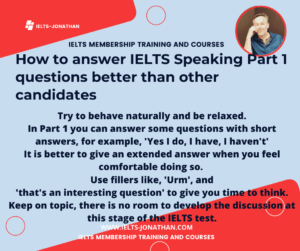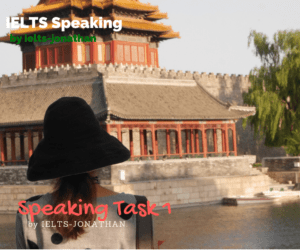The basic ‘must know’ preparation tips for a higher score in this part of the IELTS Speaking Test.
Look at these Introduction questions for Part 1 of the Speaking Test.
Can you give good answers to these?
Could you extend you answer where necessary?
There is no right or wrong answer, but there is a trick question!!
The difference between opening and development questions
What is your (full) name?
Can I have your name, please?
Could you tell me your full name, please?
What shall I call you?
How can I address you?Does your name have any special meaning?
Is your name important to you?
Do Korean/Chinese (your nationality) people like changing their name? Why?
Have you ever changed your name? Why or why not?
Why do so many people change their name?
Do you work or study?
Okay, did you see the trick questions?
The trick questions are all the first five questions.
These are the questions that come before Part 1 of the Speaking Exam.
The examiner needs to follow a script to get the test going and two questions on the script are similar to the first five questions. See how similar they are.
This part of the recording is not assessed by the examiner, therefore you don’t need to extend you answer.
What’s is you full name?
Can I have you name please?
Could you tell me your full name, please?
My name is Maria Katrina Lopez.
What shall I call you?
How can I address you?
You can call me Kat. My friends call me Kat.
Relax because these questions are not assessed.
That’s easy to remember, isn’t it!
Developmental Questions
Now you have established the opening IELTS questions about your name are not assessed, lets look at the questions which follow and how to extend the answers to get a good IELTS score in this area.
The format of the test means the first set of question will be related to your work or your studies.
The next two sets of questions will be on any number of randomly chosen topics from the examiners script.
In these three sets of IELTS scripted questions, if you can extend your answer you are already making your test easier.
Not only will the test seem to finish quickly, but the examiner will have less opportunity to ask the more difficult questions on their script, for example why or why not.
The most important reason to extend your answer is that you will probably score higher marks for fluency, an IELTS band descriptor the examiner uses to give an IELTS score.
Extending your answer will also create opportunities to display your vocabulary and grammar which is another IELTS band descriptor the examiner uses.
Let’s look at some random IELTS examples and the response and development.
Does your name have any special meaning?
No, it doesn’t really have any special meaning in my language, but it is a very common name for a girl. I know of at least three Marias, so, yes, it’s a popular name in my country, and in other languages too. I think it is used in English as well.
Yes, my middle name is Katrina, which means Catherine in English. But my close friends call me Kat. That’s the shortened name, and I suppose using Kat means my friends are close to me. I don’t like people to call me Kat if I don’t know them.
Is your name important to you?
Yes, its very important.
Firstly, because it’s the name of my grandmother, but also I believe it reflects my personality. I really am a Maria.
Do Korean/Chinese (your nationality) people like changing their name? Why?
Yes, I think that when we live abroad or study abroad, we like to change our name for a variety of reasons.
I think firstly it is easier for a teacher to remember, as well as friends who have western names.
It also makes it easier when you have to sign a document, you know if you have to sign a form or check in at a hotel for example.
Maybe it is a kind of fashion for young people. I’m not sure if older people change their names, they are more traditional, aren’t they but I know who have.
Extending Part 1 IELTS questions
So can use see how longer answers in IELTS Speaking part 1 are better than short answers.
Try these now.
Can you extend the answer to these questions using the prompts?
Practice how you would answer them.
Have you ever changed your name? (Don’t forget the why or why not!)
Yes + to what + why + how did people react
No + why not + do you know people who have + is there a situation where you might
Why do so many people change their name?
Is this true in your culture + If yes, why +and give an example
If not, why do you think it is not + for what reason might this happen/not happen + is there an example you can use?
Remember at the beginning that the common IELTS topic is about work or study.
This question is the first part of the speaking assessment.
Don’t overextend your answer here, as there are more questions to follow in the 3 to 4 minutes speaking time.
These are good example to follow, notice you can use the past tense too. Of course, your examples are your
Do you work or study?
I study + where + what do you study + for how long + why
I currently study Law at Leeds college. I’m in the second year and I plan to do an internship at the end of my degree.
I work + where + what do you do + for how long + why
I have worked for an NHS trust as a clinical operator for about 3 years now, but I am planning to relocate to Canada with the IELTS test.
I studied + where + what did you study + for how long + why
Before I started working in Toronto, I studied a Masters in Contemporary Performance Arts in Perth for two years. This has given me the experience to work in the arts sector.
I worked + where + what did you do + for how long + why
I worked for in Winchester for two years in an NHS trust as a General Nurse before moving to Southampton. I worked there as it was near to my graduating college.
Awards for Fluency
Fluency needs to be controlled but remember, if you can increase your fluency score, then the examiner can focus on awarding good marks for the other marking criteria such as use of grammar, vocabulary and pronunciation.
I’m Jonathan
I’ve taught IELTS and University English in more than a dozen universities and schools around the world.
I’m a parent, traveller and passionate about language teaching and helping students achieve their dreams.
Whilst living in Austria or working in Asia, I run IELTS courses to help students get to where they want to be.
If you are serious about IELTS, connect with me to see how I can help you.






Was this helpful? Leave a comment :)